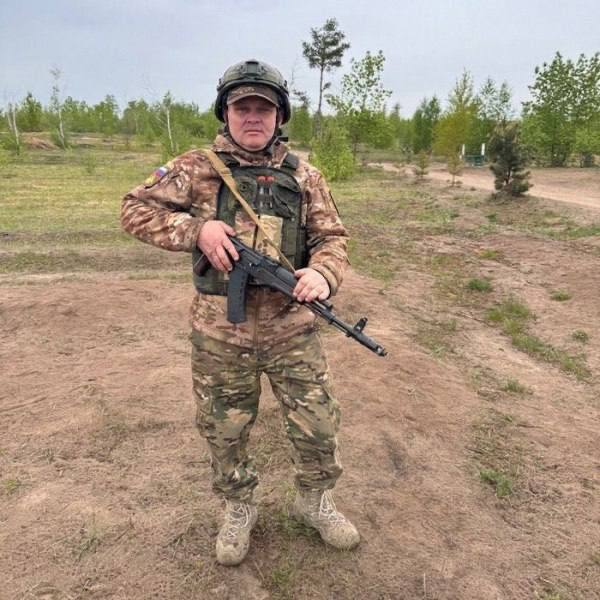In a video released by Ukraine's 3rd Assault Brigade, Russian troops appear to be surrendering in Vovchansk.

www.businessinsider.com
Russian troops surrender to an elite brigade as the Kharkiv front holds, Ukraine says
Cameron Manley
A screenshot from Ukraine's 3rd Assault Brigade's video appearing to show Russian soldiers being captured in the Vovchansk region. Ukraine's 3rd Assault Brigade
- Dozens of Russian soldiers have surrendered in Vovchansk in recent weeks, Ukraine says.
- A video released by Ukraine's 3rd Assault Brigade appears to show Russian prisoners of war.
- The Russians reported major losses, poor conditions, and a lack of support from senior officers.
Russian soldiers have been surrendering to an elite Ukrainian combat brigade in the northern town of Vovchansk in the Kharkiv region, reports say.
A
video released on Wednesday by Ukraine's 3rd Assault Brigade appears to show Russian troops emerging from a trench with their hands raised or tied behind their backs.
The video seems to confirm recent reports that dozens of Russian soldiers have been surrendering around Vovchansk, where heavy fighting has raged since Moscow launched a cross-border offensive toward Ukraine's second-largest city, Kharkiv, last month.
The prisoners of war were later filmed and interviewed, sitting in what appeared to be a school classroom.
Business Insider couldn't independently verify the video.
Several of the captured soldiers said they'd been forced into the Russian army because of financial or legal trouble. Some said they'd received as little as one week of training before being sent to the front.
Food and water were limited, and often, they had to buy supplies with their own money, they said.
Almost all the prisoners said their units had suffered severe losses during attacks against Ukrainian positions.
"We received an order to attack positions inside a chemical factory. I don't know, maybe there were 70 of us. We drove there at night," one POW said.
"The drones came out of nowhere and wiped almost everyone out. Most of us were hit. Only seven of us survived, and we were wounded. Then we were taken prisoner," he said.
Russia had a golden opportunity to open a new front in Ukraine but is squandering it, military experts say
Another soldier said he'd been taken prisoner after being the "only survivor" in his unit.
Many complained about the leadership of their officers, who, they said, didn't participate in the costly assaults.
Ukraine's 3rd Assault Brigade published footage of Russian soldiers it says it captured in recent fighting. Ukraine's 3rd Assault Brigade
The video appears to confirm major Russian losses and surrenders in the region, supporting the idea that Russia's attempt to open a second front in Ukraine's north has stalled.
Last week,
Nazar Voloshyn, the spokesperson for the Khortytsia Regional Command, which is responsible for ground operations in the area, said that "close to 60 Russians" were captured in a single day of combat.
Vovchansk, 3 miles from the Russian border, was 70% under Ukrainian control, Voloshyn said.
An earlier
video published on June 6 by Ukraine's 36th Marine Brigade appeared to show two Russian soldiers, both wounded, being captured during a Ukrainian counterattack in Vovchansk.
In February, some 30,000 Russian troops began pouring over Ukraine's northern border into the Kharkiv region, opening up a new front for Ukraine's already-stretched defenses.
Yet four months later, Russian forces have stalled, and the White House national-security communications advisor,
John Kirby, has declared the offensive "all but over."
The Institute for the Study of War said that Russian President
Vladimir Putin may have rushed the offensive in an attempt to get ahead of incoming Western aid, fielding "an understrength force" in the process.
The RAND geopolitical strategist
Ann Marie Dailey previously told BI that Putin probably never had the means to capture Kharkiv city but hoped to create a buffer zone to shield the border region of Belgorod from Ukrainian attacks.
Nonetheless, Dailey told BI, "I think that there's a broader offensive effort that you'll see from Russia later in this summer."
Correction: June 17, 2024 — An earlier version of this story misstated the time between when Russian troops first entered Kharkiv in February and John Kirby's statement about the offensive. It was four months, not four weeks. An earlier version of the story also misspelled Khortytsia.Massa's calling c00n, go run! Why are you talking about pro black when you literally carry water for white supremacy you c00n fakkit
-or cac?
. What's your white daddy Zelensky and his Nazi battalions done for black folk again? Apart from treat them like shyt at the start of the war? This is how it's apparent what you really are





 "
"

